NAIROBI, Sept. 28 (Xinhua) -- An international birds conservation group has blamed extinction of birds in Africa to poisoning, electrocution, collision with energy poles and sale of bird parts for belief-based uses.
BirldLife International said in its latest State of Africa's Birds report released in Nairobi on Friday that one in nine bird species in Africa are facing a high risk of extinction in the wild.
"Populations of threatened birds such as Vultures and Grey Parrots have declined by over 90 percent in the last four decades," the report says.
The report says that vultures are mainly facing threats from poisoning in Botswana, Kenya, and Zimbabwe.
It notes that through BirdLife Africa partnership measures are being put in place for reducing, detecting and minimizing impacts of vulture poisoning incidents.
"Vulture Safe Zones are also being established in Zambia, with 250,000 ha already having been secured through dialogue with landowners," said the organization.
The organization has also raised awareness and advocacy against vulture trade for belief-based use in Nigeria, and undertaken research as well as lobbying for consideration of the needs of vultures in the development of wind energy projects in Egypt and Kenya.
The report names other threats facing birds and biodiversity in the continent as agricultural expansion, infrastructural development, logging, over-exploitation of natural resources, urbanization, pollution, disturbance and invasive alien species.
"All of these activities though profitable in the general sense are instead driving bird declines and diminishing natural resources," it said.
The organization observed that Albatross Task Force (ATF), an initiative it set up and includes an international team of experts and working alongside fisheries stakeholders in reducing high rates of seabird bycatch, has proven to be successful, having reduced albatross bycatch in South Africa by 99 percent.
The report calls on African governments to collaborate with local experts and community members towards a common conservation agenda based on scientific and socio-economic facts in achieving far-reaching and enduring impacts.
BirdLife said that it will continue to support African member states by providing information to support informed decision making, as well as national reporting.
BirdLife has in the past successfully advocated for the uplifting of Grey Parrot (Endangered) from Appendix II to Appendix I of the Convention on International Trade in Endangered Species (CITES).
It is currently supporting African state parties to the Convention of Biological Diversity (CBD) to develop and implement National Biodiversity Strategies and Action Plans in order to attain the 20 Aichi biodiversity targets.











